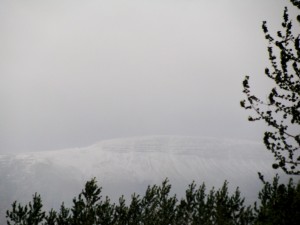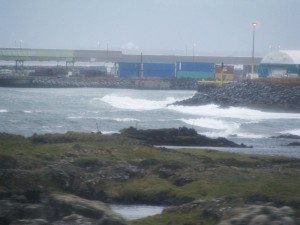The waterfall that flowed into the sky. Posted by hulda on Sep 11, 2012 in Icelandic customs
 Búast má við stormi (= a storm is expected) is a sentence that makes me immediately a little bit worried whenever I see it at the Icelandic Met Office‘s webpages. It tends to mean it’s soon going to be impossible to walk outdoors and if going out cannot be avoided it’ll be a very uncomfortable experience to say the least. The wind will be so strong (yesterday and today’s record seems to be 31 m/s at Papeyjar) it’s hard to walk against it and there will be all kinds of things flying around f.ex. toys, sand, litter, things that you’d rather not catch with your face*. At least breathing will be effortless. You only need to open your mouth and the weather will take care of everything else.
Búast má við stormi (= a storm is expected) is a sentence that makes me immediately a little bit worried whenever I see it at the Icelandic Met Office‘s webpages. It tends to mean it’s soon going to be impossible to walk outdoors and if going out cannot be avoided it’ll be a very uncomfortable experience to say the least. The wind will be so strong (yesterday and today’s record seems to be 31 m/s at Papeyjar) it’s hard to walk against it and there will be all kinds of things flying around f.ex. toys, sand, litter, things that you’d rather not catch with your face*. At least breathing will be effortless. You only need to open your mouth and the weather will take care of everything else.
An Icelandic wind detector, according to a joke, is a thick pole stuck vertically into the ground with a piece of heavy iron chain attached to the top. The degree of the chain’s angle tells you the weather, albeit on a little bit Icelandic a scale: 0° means for example that the wind detector is broken, please contact the maintenance. 40° is a breeze, 80° comes with a warning of low-flying trucks and 90° – Velkomin til Íslands! Yet some news of yesterday’s storm makes this joke sound somewhat less funny.
It was snowing over Esjan. On an ordinary day the mountain is fully visible, during the worst of the weather it could barely be seen at all.
The storm went over the whole country but the areas that were hit the worst were Vestmannaeyjar in the south and the northeast corner of Iceland. Many areas in the north-east are still without electricity, lots of sheep are dead, buried in snow, a whole waterfall, Seljalandsfoss, turned upwards and asphalt was torn off roads. Rocks flying around shattered windows of houses and cars and up north over thirty travelers were stuck in their cars near Dettifoss. The volunteer rescue units, Björgunarsveitinn, have definitely been busy.
Yet the fact remains that heavy storms are not unusual for this country and for this time of the year. It’s just one more thing Icelanders have put up with for as long as they have lived here. Eskimo-Aleut languages are often claimed to have “a thousand words for snow” and while this is not exactly correct, what about Icelanders and words that mean wind? Let’s see how many I can quickly find:
Andvari = very light breeze
Beljandi = roaring wind
Blástur = breeze
Blær = gentle breeze
Bræla = fog, wind and rain that happen all at the same time
Fárviðri = hurricane, pretty much the worst you can get
Gola/stinningsgola = breeze/moderately strong breeze
Gjóla = fresh breeze
Gustur = gust
Hvass/allhvass/hvassviðri = windy/moderate gale/gale
Illviðri = tempest
Kaldi/stinningskaldi = fresh breeze/strong breeze
Kul = breeze
Logn = calm (no wind)
Mannskaðaveður = bad weather that causes casualties
Ofsaveður = violent storm
Ofviðri = violent storm, tempest
Rok/hávaðrok/aftakarok = storm/harsh storm/violent storm
Snarpur = brisk
Stormur = storm
Strekkingur = strong breeze
Súgur = draft of air
Vindur = wind
I found in total 29 words and these are likely not even nearly all of them. Do you know more words in Icelandic that mean wind?
*Here’s an Icelandic Toyota ad that makes some very good examples of this.

Build vocabulary, practice pronunciation, and more with Transparent Language Online. Available anytime, anywhere, on any device.
About the Author: hulda
Hi, I'm Hulda, originally Finnish but now living in the suburbs of Reykjavík. I'm here to help you in any way I can if you're considering learning Icelandic. Nice to meet you!






Comments:
Jjon:
There’s “andi” too. 🙂
hulda:
@Jjon Ooh, interesting! My dictionary only defines andi as breath, spirit or mind – if it can also mean a type of wind it sounds very poetic.